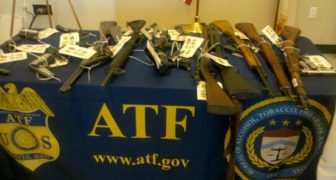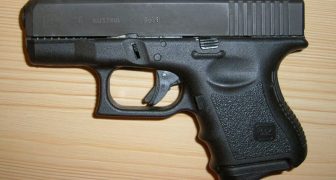This is a guest post by Kevin Steffey 
Probably the only subject to generate more squabbles than politics is the endless discussion of what qualifies as the best firearm for home defense and hunting. If you are considering purchasing a firearm, you need to ask yourself a few questions go out to shop. The first question you need to ask yourself is whether you need a gun for self-defense or hunting. Realize that there is no firearm that’s perfectly suited for each individual or situation. Whatever firearm you choose to buy, make sure it is safe and comfortable. Let’s now dive deep and look at a few things to consider when choosing a firearm for home-defense and hunting.
Do a thorough research
Don’t buy a gun based only on the recommendation of a family member or a friend or simply because it featured in the last issue of Guns & Ammo. Be sure to do your research before you go shopping. A few days spent conducting research will help you evade making costly mistakes. Know which types of guns to avoid before you go out to shop. Learn about the different calibers and ammunition types that are available on the market. Stay away from “this is the best gun for survival” type of stuff posted on the web as most of the information is wrong and of little use.
research will help you evade making costly mistakes. Know which types of guns to avoid before you go out to shop. Learn about the different calibers and ammunition types that are available on the market. Stay away from “this is the best gun for survival” type of stuff posted on the web as most of the information is wrong and of little use.
Know why you want a gun
Firearms can be useful for numerous applications, such as hunting, target shooting as well as protecting your family. For hunting, you want a gun that will not disappoint you. Of course, deer baits will ensure that you go home with some fresh venison, but you want a gun that will kill fast-moving animals such as deer with as few hits as possible. You need a gun that’s accurate, with enough power to kill. The right firearm for you is dependent on the type of game you wish to hunt. For home defense, a rifle, a heavier pistol, or a shotgun are excellent choices as they are likely to  stop bad guys with one or two shots.
stop bad guys with one or two shots.
Choose based on your interest
As stated, there is no firearm that’s suited for each person or condition. Some individuals choose to fire competitively, and this can be very rewarding. If you wish to become an accurate shooter, choose a good rifle. If you want to be a fast shooter, then a smaller pistol is your best bet. In addition to the smaller bullet, a pistol can be easier to use at home. The rifle is harder to use around tight corners than pistols and is perfectly suited for hunting. Whatever your option, it should make you feel comfortable and safer. Also, it should be a firearm that other members of your family can use as well.
Be sure to consider frame sizeIf you are expecting to carry a concealed handgun, go for polymer framed firearm as it is super-light. Metal framed firearms are heavier and can be burdensome over time. There are heavier belts on the market, however, to mitigate the weight effect. Smaller handguns help concealment as well because they are easier to hide. For home defense, it makes perfect sense to have a large frame. The longer slide aids accuracy by maximizing the distance between the rear and front sights, while the heavier weight will minimize recoil and allow for quicker follow up hits.
Make sure the gun fits your body
If you think that you can get out of your bed, put on your rubber hunting boots and stroll through the woods with any firearm, you will be in for a big surprise. If your goal is hunting, you need a gun that fits both your body and grip. A firearm that fits your body is more accurate than if you need to force your body to conform to its size and shape. The gun should fit your body and should feel as natural as possible when held in the shooting position. No one can determine this better than you. You have to hold your weapon and aim it to ascertain how well it fits both your body and grip.
There you have it, tips on how to choose a firearm for home-defense and hunting. Before you buy any firearm, go to your local rifle dealer and try out as many different types, models, and sizes for feel. You can also ask friends and family members to let you have a feel of their rifles. Ask them what they like and don’t like about their rifle.
Probably the only subject to generate more squabbles than politics is the endless discussion of what qualifies as the best firearm for home-defense and hunting. If you are considering purchasing a firearm, you need to ask yourself a few questions go out to shop. The first question you need to ask yourself is whether you need a gun for self-defense or hunting. Realize that there is no firearm that’s perfectly suited for each individual or situation. Whatever firearm you choose to buy, make sure it is safe and comfortable. Let’s now dive deep and look at a few things to consider when choosing a firearm for home-defense and hunting.
Do a thorough research
Don’t buy a gun based only on the recommendation of a family member or a friend or simply because it featured in the last issue of Guns & Ammo. Be sure to do your research before you go shopping. A few days spent conducting research will help you evade making costly mistakes. Know which types of guns to avoid before you go out to shop. Learn about the different calibers and ammunition types that are available on the market. Stay away from “this is the best gun for survival” type of stuff posted on the web as most of the information is wrong and of little use.
Know why you want a gun
Firearms can be useful for numerous applications, such as hunting, target shooting as well as protecting your family. For hunting, you want a gun that will not disappoint you. Of course, deer baits will ensure that you go home with some fresh venison, but you want a gun that will kill fast-moving animals such as deer with as few hits as possible. You need a gun that’s accurate, with enough power to kill. The right firearm for you is dependent on the type of game you wish to hunt. For home defense, a rifle, a heavier pistol, or a shotgun are excellent choices as they are likely to stop bad guys with one or two shots.
Choose based on your interest
As stated, there is no firearm that’s suited for each person or condition. Some individuals choose to fire competitively, and this can be very rewarding. If you wish to become an accurate shooter, choose a good rifle. If you want to be a fast shooter, then a smaller pistol is your best bet. In addition to the smaller bullet, a pistol can be easier to use at home. The rifle is harder to use around tight corners than pistols and is perfectly suited for hunting. Whatever your option, it should make you feel comfortable and safer. Also, it should be a firearm that other members of your family can use as well.
Be sure to consider frame size
If you are expecting to carry a concealed handgun, go for polymer framed firearm as it is super-light. Metal framed firearms are heavier and can be burdensome over time. There are heavier belts on the market, however, to mitigate the weight effect. Smaller handguns help concealment as well because they are easier to hide. For home defense, it makes perfect sense to have a large frame. The longer slide aids accuracy by maximizing the distance between the rear and front sights, while the heavier weight will minimize recoil and allow for quicker follow up hits.Make sure the gun fits your body
If you think that you can get out of your bed, put on your rubber hunting boots and stroll through the woods with any firearm, you will be in for a big surprise. If your goal is hunting, you need a gun that fits both your body and grip. A firearm that fits your body is more accurate than if you need to force your body to conform to its size and shape. The gun should fit your body and should feel as natural as possible when held in the shooting position. No one can determine this better than you. You have to hold your weapon and aim it to ascertain how well it fits both your body and grip.
There you have it, tips on how to choose a firearm for home-defense and hunting. Before you buy any firearm, go to your local rifle dealer and try out as many different types, models, and sizes for feel. You can also ask friends and family members to let you have a feel of their rifles. Ask them what they like and don’t like about their rifle.
Author Bio
 Kevin Steffey is an avid hunter and freelance writer, the founder of Deer Hunting Field. He loves spending time in the field with his rifle more than almost anything else. He also occupies his off-time discussing deer and their habits online. But more than anything, he wants to teach and educate about hunting …
Kevin Steffey is an avid hunter and freelance writer, the founder of Deer Hunting Field. He loves spending time in the field with his rifle more than almost anything else. He also occupies his off-time discussing deer and their habits online. But more than anything, he wants to teach and educate about hunting …


Speak Your Mind